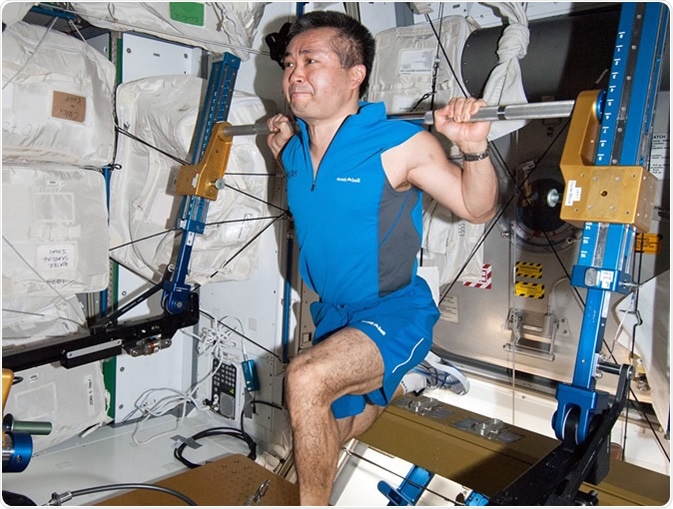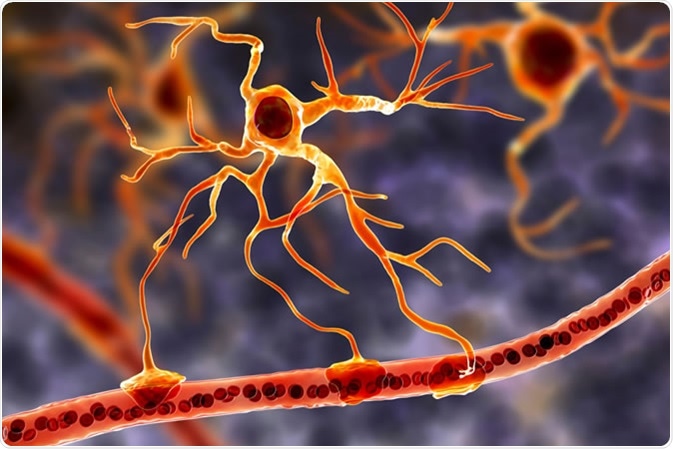Skip to:

NASA Astronaut
Astronauts experience severe forces and changes to their bodies during spaceflight. The extensive G-force upon lift-off and landing as well as the zero gravity (microgravity) environment whilst in space are some of the forces affecting astronauts’ bodies.
To maintain muscle and bone mass whilst in space, astronauts need to train well in advance of missions, extensively during spaceflight as well as after flight.

Astronauts on the International Space Station maintain their health in the absence of gravity
Symptoms post-flight usually involve neurovestibular disturbances characterises by vertigo when walking and standing, difficulty walking in a straight line, blurred vision, clumsiness and difficulty concentrating.
Whilst much research has focused on the effect of such forces on the body’s muscles, the effect on the brain has largely been neglected.
Brain Volume Changes in Astronauts
A study by Koppelmans and colleagues, published in 2016, aimed to investigate bodily function and brain structure of 27 astronauts who had completed a space shuttle mission. Of these, 13 had just been on a shuttle mission where they spent an average of 14 days in space, whereas the rest had spent an average of 162 days on the International Space Station (ISS).
Grey matter is the part of the brain which contains most cell bodies of neurons and glial cells (support cells such as astrocytes and oligodendrocytes) as well as many synapses (connections between neurons). Astronauts’ MRI scans revealed that there were broad decreases to grey matter volume within the temporal and frontal cortices as well as within parts of the cerebellum.

Astrocytes, brain glial cells, also known as astroglia, connect neuronal cells to blood vessels - Illustration Credit: Kateryna Kon / Shutterstock
Reductions in grey matter may actually be attributed to increased cerebrospinal fluid (CSF) and is similar to patients with idiopathic normal pressure hydrocephalus.
Furthermore, these differences were more profound in astronauts completing longer ISS missions rather than those who had just completed shuttle missions. Therefore, longer space flight duration seems to have a more detrimental effect on brain volume.
Another finding from Koppelmans study was that there were increases to grey matter volume in the precentral and postcentral gyri—the ridge-like elevations found on the surface of the cerebral cortex—parts of the cingulate cortex and the precuneus cortex.
Astronauts have to undergo extensive training before and during spaceflight to maintain muscle mass, and this can result in localised increased grey matter in particular the sensorimotor regions. This may be due to neuroplasticity, or adaptation of the brain.
In particular, the largest increases to grey matter correlated areas that represent the lower limbs. On earth our legs have to counteract the effects of gravity the most and in space they suffer the most structural changes. As such, the brain may be adapting to the new environment by an increase in sensitivity of inputs and outputs to the legs.
Russian Cosmonauts
Another study aiming to look at brain tissue volume changes in Russian cosmonauts, published in N Engl J Med (2018), found very similar patterns in grey matter changes. They also discovered that grey matter volume did seem to recover, although not completely, several months post-flight.
The white matter (part of the brain containing myelinated axons or connections between different brain regions) post-flight was found to be reduced globally as well as in particular the left temporal lobe. As such, the ventricular space containing CSF had enlarged.
At long-term follow up stage, the CSF volume in the ventricles returned to baseline, however, CSF across the entire subarachnoid space (space between the skull and brain) had increased.
The abnormal accumulation of CSF and reductions in grey/white matter volumes at particular areas may be responsible for the clinical symptoms associated with post-flight, including ocular/visual disturbances, which may be due to increased CSF pressure on the retina.
In summary, spaceflight seems to have a negative effect not only on the body, but also the brain. This is primarily characterised by reduction to brain matter volumes and increased ventricular space, or increased CSF within the brain. However, regular training can lead to localised increases to grey matter in key brain regions.
Together, these may have long-term implications to vestibular and ocular function, but more research is needed to investigate how these changes occur and what their effect is on health in the long-term. These could have implications on the future of spaceflight missions to the moon, mars and beyond.
Sources
- Koppelmans et al, 2016. Brain structural plasticity with spaceflight. npj Microgravity 2:2. https://www.nature.com/articles/s41526-016-0001-9.pdf
- Van Ombergen et al, 2018. Brain Tissue–Volume Changes in Cosmonauts. N Engl J Med 379:1678-1680. https://www.nejm.org/doi/full/10.1056/NEJMc1809011
Further Reading
Last Updated: Sep 24, 2019